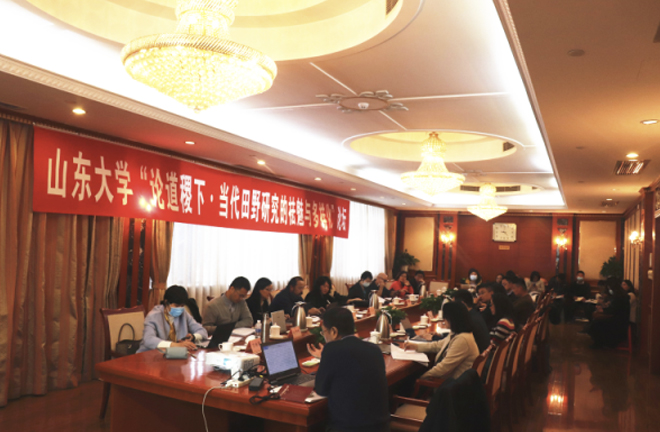Fieldwork underpins folklore studies

Scholars exchange views on fieldwork and ethnographic research methods, as well as the writing of folklore ethnography at a seminar recently held in Jinan, Shandong Province. Photo: FILE
A seminar on folklore was held recently in Jinan, Shandong Province, aiming to reflect on ethnographic research methods in the field of folkloristics, and explore innovative methods which expand this discipline.
Fieldwork is a basic research method in many social sciences including folkloristics, anthropology, and sociology, said Liu Tieliang, a professor from the School of Chinese Language and Literature at Beijing Normal University. In recent years, much attention has been paid to enhancing fieldwork’s methodological value. Present-day people are one focus of field investigations in the humanities and social sciences. Only by communicating with transparency and gaining mutual trust can we deeply understand local people and their lives. The subject-object relationship of daily communication in fieldwork should be a foundation for the contemporary transformation of Chinese folklore studies.
With the development of new technologies, new methods such as online interviews and virtual experiences tend to replace traditional field methods. However, according to Thomas DuBois, a professor from the School of Chinese Language and Literature at Beijing Normal University, field surveys can widen the depth of surveys and cannot be replaced by any other method. Field researchers live with respondents in their own communities for an extended period of time, thus field research plays a unique role in understanding a work community, business community, or a handicraft community. When gaining the trust of a surveyed community, field research offers a deeper understanding of the values and internal logic of community life. This is the core value of fieldwork.
Zhao Yanmin, a professor from the School of Japanese Studies at Dalian University of Foreign Languages, noted that during a field investigation, the interaction between the investigator and the respondent deserves further attention. As the researcher and the surveyed respondent reach a consensus, or “fusion of horizons,” it is a necessary part of the process for the researcher to reflect on their own preconceptions, and examine the transfer process of empirical interpretation between them.
Field research provides a reference not only for observing relationships among people, but also for examining the relationship between people and nature, said Sun Jiuxia, a professor from the School of Tourism Management at Sun Yat-sen University. In a field survey of a Tibetan village, Sun found that local knowledge and indigenous wisdom are still full of vitality and beauty, though in the context of modernization. Self-governance, based on a shared cultural schema, has become an effective pathway for community development.
Based on a field survey with villages as a unit of study, Zhang Shishan, a professor from the Advanced Institute of Confucian Studies at Shandong University, found that the sense of place is a potential force that affects a local society’s operation. The sense of place represents a deep cultural structure condensed due to long-term exchanges, consultations, and interactions in rural society. It provides a lens to understand interactions among national processes, local social development, and people’s daily lives.
In a field study on the subject of “fellow townsmen sharing a trade” in some villages and towns located in Jiangsu Province, Ji Zhongyang, a professor from the College of Humanities and Social Development at Nanjing Agricultural University, found that these communities can form in any mobile modern society, whether in a city or a village. This type of social network seems to follow a traditional rural logic, but in fact it is subject to the grander post-industrial social logic. Only in a post-industrial information society, can a traditional handicraft industry have scattered labor, and can fellow villagers be engaged in the same industry.
Ethnography and folklore records are widely used in knowledge production systems within ethnology, anthropology, and folkloristics. Some scholars have realized that writing these ethnographies based on field research is creating a new paradigm which captures tremendous changes in the development of our times.
Contemporary folklore ethnography has Chinese local characteristics in terms of its text forms, descriptive content, and functional orientations, said Wang Xiaobing, a professor from the Department of Chinese at Sun Yat-sen University. In the new era, folklorists have practiced “folklore ethnography as a research approach,” pursuing “field folklore records” based on fieldwork and specific “contexts.” For example, new concepts including “the representative culture-oriented writing style of folklore ethnography” and “labor modes,” have created new writing paradigms for folklore ethnography. It is also inspiring to witness the introduction of such topics as the interaction between etiquette and customs into fieldwork.
Traditional ethnography of anthropology pursues facts and objective descriptions, and it also includes the construction of ideas, said Fang Lili, a research fellow from the Institute of Anthropology of Arts at Chinese National Academy of Arts. As human beings enter the era of intelligence, anthropologists should become an important academic force in terms of exploring the emotional world. The macro world, under the anthropological angle, can be reconstructed with ethnographic narratives in multiple styles and expressions.
Edited by YANG LANLAN
